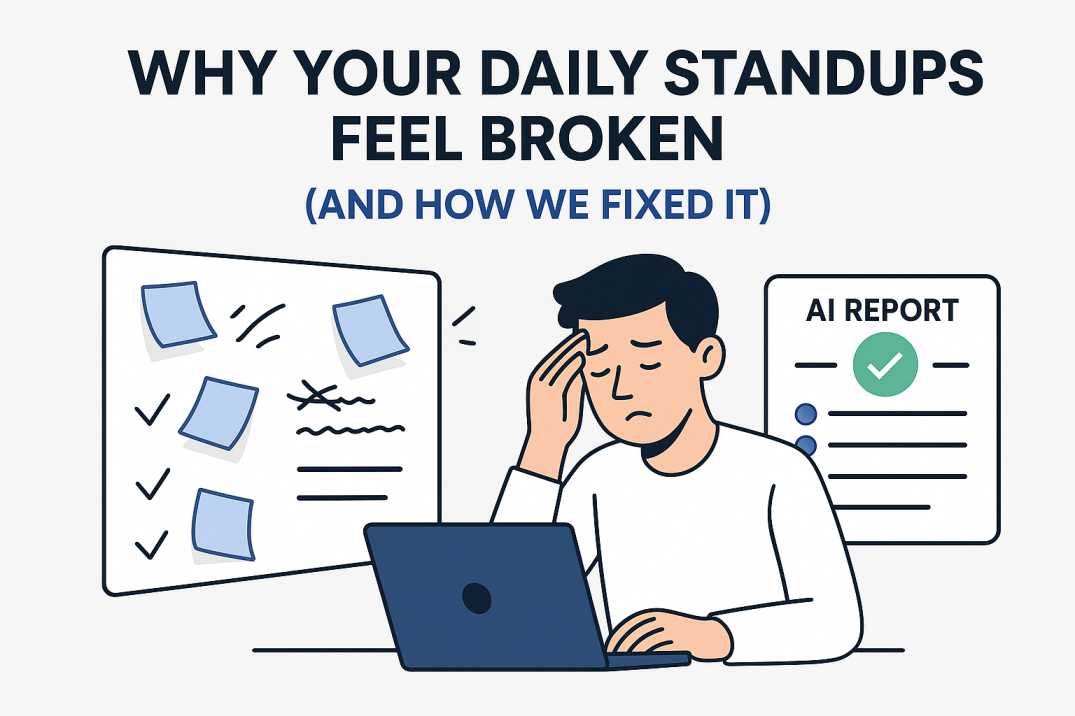Why Your Daily Standups Feel broken (and How We Fixed it)

If you manage an engineering team, you know daily standups can easily become the worst meeting of the day.
- Developers repeating yesterday's update like it’s a script.
- Managers trying (and failing) to track a dozen different tools like Jira, GitHub, Slack, CI/CD pipelines.
- Important blockers mentioned quickly, then forgotten until they blow up.
- Everyone multitasking, zoning out, or quietly wondering why this couldn’t have been an email.
The original idea behind standups made sense when teams were small and colocated. But let's face it: today’s dev teams are complex, distributed, and juggling way more than those three simple questions were meant to handle.
We felt this pain deeply, so we decided to fix it.
What's Actually Broken About Traditional Standups
I remember my own frustration clearly: You log into Jira, you look at GitHub PRs, you check Slack, you glance at your CI/CD status. But by the time standup comes around, it's easy to miss something important because you're relying on memory and manual checks. This means:
- You miss important issues until they're urgent.
- PRs linger because reviewers get busy and nobody notices.
- Small problems turn into big delays because they weren't surfaced early enough.
No one likes meetings—but especially ones that fail at their core purpose: clear communication.
How a Good Standup Should Actually Work
From experience, here’s what actually makes daily check-ins useful:
- Highlight what's genuinely urgent like blockers that need immediate attention.
- Surface warning signs like overloaded devs or stuck tasks.
- Identify patterns, like repeated CI failures or PR review delays.
- Give everyone clear, prioritized actions to focus on today rather than just talking about yesterday.
When we started working on our solution, these were the principles we used as our guide.
Enter the Daily Standup AI Report
Our Daily Standup AI Report pulls in data automatically from Jira, GitHub, and your CI/CD system, summarizing everything your team needs to know at the start of the day. No more manually hunting for scattered details. Instead, you get a single, easy-to-read summary delivered to your Slack or inbox each morning.
Each morning’s report clearly highlights:
- What got done yesterday: Merged PRs, resolved tasks, and completed deployments.
- Immediate blockers and open PRs that require attention right now.
- Risks and early warnings like unusual developer workloads, burnout signals, or consistent build failures.
- Forecasting—quick insights into whether your team is on track for upcoming sprints and releases.
This way, instead of wasting time repeating yesterday’s news, your team can quickly spot problems, solve them immediately, and move forward.
Real-World Wins, Not Theory
Here’s how it has actually improved our workflow and some teams who’ve adopted it:
- One team found a CI/CD pipeline problem right away because the AI flagged it before standup started. They solved it early, avoiding an entire day of firefighting.
- Another team quickly spotted a PR stalled because the reviewer was out sick. They reassigned it and shipped on schedule without drama.
These aren’t fluffy examples they’re practical cases where automated insights led directly to better, faster decisions.
Making Standups Useful Again
The Daily Standup AI Report isn’t another shiny toy to clutter your tools—it’s built to genuinely simplify your daily workflows. It makes your standups quick, useful, and actionable again.
Because let's be honest: developers don’t need more meetings. They need clarity on what matters and freedom to focus on coding, not talking.
Next: In our follow-up, We’ll walk you through exactly how the report works behind the scenes, and how you can start using it right away.

